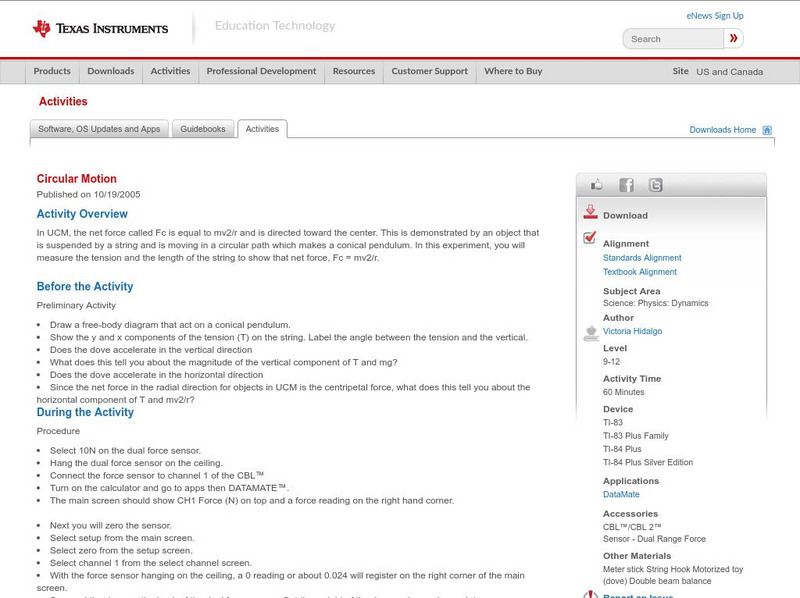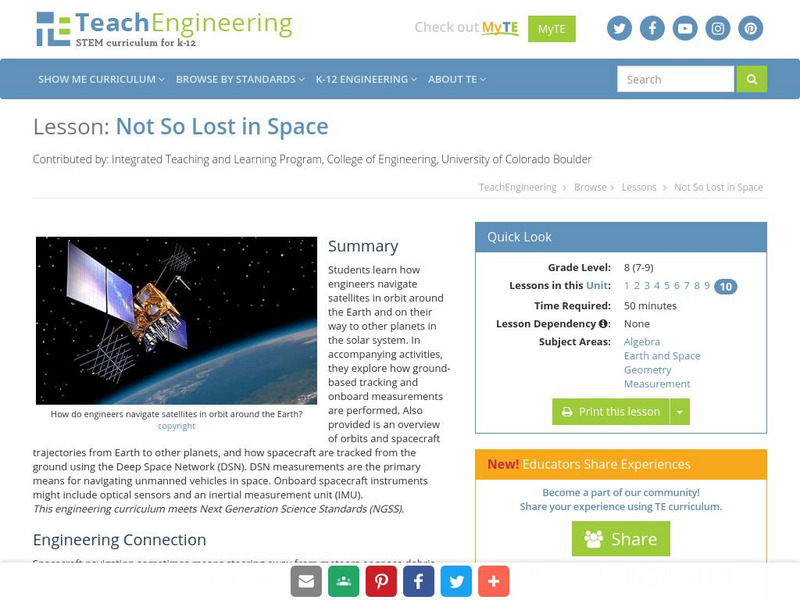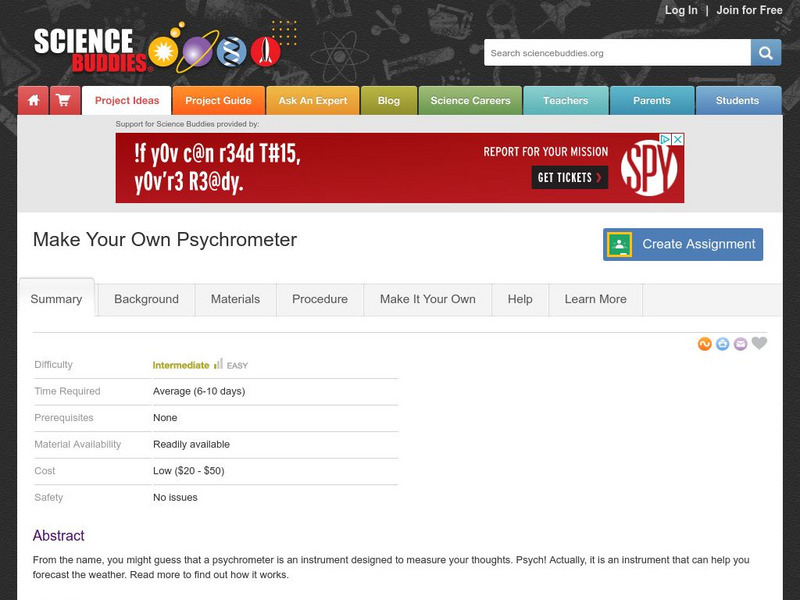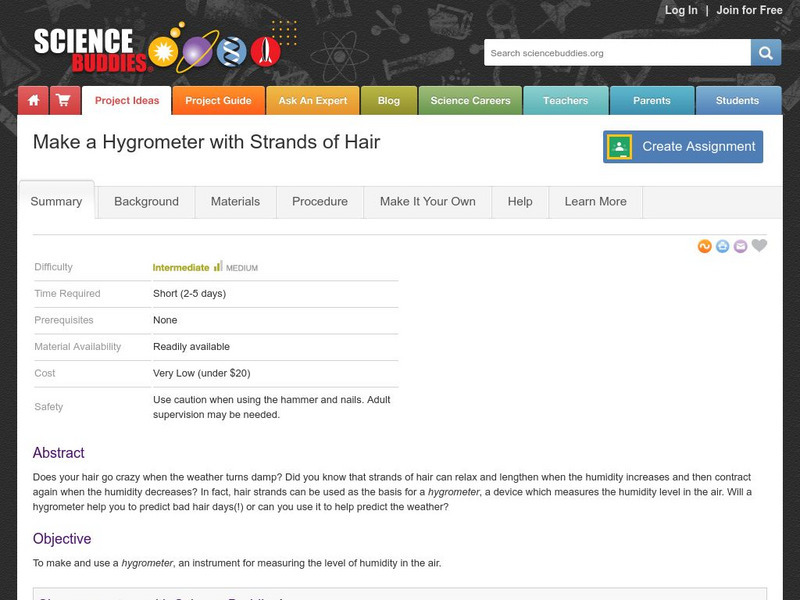National Geographic
National Geographic: Measuring Weather With Tools
Work with students to identify and understand the tools used to measure weather and how they're used.
Alabama Learning Exchange
Alex: Weather Instruments for Sale
During this lesson, students will use knowledge they have learned about weather instruments to create a catalog advertisement. Students will use descriptive writing to advertise the use of the weather instrument. They will also use...
Texas Instruments
Texas Instruments: Summarizing Distributions of Univariate Data
Students understand statistical concepts like center of data and the amount of data variation from the center. They calculate the measures of the center of a distribution and the measures of spread for the data collected as a list....
Texas Instruments
Texas Instruments: Circular Motion
In UCM, the net force called Fc is equal to mv2/r and is directed toward the center. This is demonstrated by an object that is suspended by a string and is moving in a circular path which makes a conical pendulum. In this experiment, you...
Texas Instruments
Texas Instruments: Friction
Students study how the nature of two materials in contact, and the smoothness of their surfaces affect the magnitude of the sliding force of friction. They use a force sensor to measure frictional force for different surfaces.
American Geosciences Institute
American Geosciences Institute: Earth Science Week: Build Your Own Weather Station
Students are guided in how to build their own weather station that will measure temperature, humidity, precipitation, atmospheric pressure, and wind direction and speed.
TryEngineering
Try Engineering: Making Sense of Sensors
Lesson explore sensors focusing on ones that measure humidity. Students work in teams to design, build, test, and evaluate a hygrometer which was made out of everyday materials to measure humidity levels.
Center for Innovation in Engineering and Science Education, Stevens Institute of Technology
Ciese Real Time Data Projects:collecting Weather Data and Keeping a Weather Log
Over a period of two weeks students will use their class-made instruments to measure and record weather data. Students will also compare their data to online weather data. The final activity involves analyzing the collected data to look...
NASA
Nasa: Using Radiosonde Data From a Weather Balloon Launch
This lesson plan allows students to learn about the layers of the atmosphere and to learn how to graph real atmospheric data.
TeachEngineering
Teach Engineering: Not So Lost in Space
Students learn how engineers navigate satellites in orbit around the Earth and on their way to other planets in the solar system. In accompanying activities, they explore how ground-based tracking and onboard measurements are performed....
CK-12 Foundation
Ck 12: Earth Science: Collecting Weather Data
[Free Registration/Login may be required to access all resource tools.] Describes the various instruments that scientists use to measure weather conditions, including advanced tools like satellites and radar.
Science Struck
Science Struck: Barometer Units
Explains the different measurement units that are used in barometers and provides conversion tables.
Cuemath
Cuemath: Temperature
The article explains temperature. Specifically, you will learn about the temperature scale, temperature scale conversions, and the types of instruments used to measure temperature. Included are solved examples and interactive problems...
Science Buddies
Science Buddies: Make Your Own Psychrometer
From the name, you might guess that a psychrometer is an instrument designed to measure your thoughts. Actually, it is an instrument that can help you forecast the weather. Read more to find out how it works.
Science Buddies
Science Buddies: Make a Hygrometer With Strands of Hair
Does your hair go crazy when the weather turns damp? Did you know that strands of hair can relax and lengthen when the humidity increases and then contract again when the humidity decreases? In fact, hair strands can be used as the basis...
Other
California Energy Commission: Science Projects: Make an Anemometer
Nice brief description of this wind speed device and the directions to make your own.
TeachEngineering
Teach Engineering: Build an Anemometer
Students create their own anemometers which are instruments for measuring wind speed. They see how an anemometer measures wind speed by taking measurements at various school locations. They also learn about different types of...
TeachEngineering
Teach Engineering: Air Under Pressure
Students are introduced to air masses, with an emphasis on the differences between and characteristics of high - versus low-pressure air systems. Students also hear about weather forecasting instrumentation and how engineers work to...
Dartmouth College
Dartmouth College: Chem Lab: Scanning Spectrometer
The scanning spectrometer measures absorbance vs. wavelength for liquid samples. Directions on how to use this instrument are provided here.
Science Struck
Science Struck: Hydrostatic Pressure vs. Osmotic Pressure
Defines and explains what osmotic and hydrostatic pressure are, how to calculate them, their applications, and the instruments used to measure them.

















